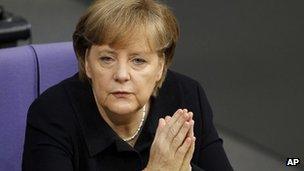Eurozone solution in sight?
- Published
- comments

German Chancellor Angela Merkel has spoken of eurozone "sinners" being brought before the courts
The frenetic round has begun. Seven days of intense diplomacy before a European summit at the end of next week. Already officials are calling it the "make or break" summit. They have done that before, but this time there is a new urgency.
The clock - or so the leaders feel - really is standing at one minute to midnight and failure.
So is there a plan?
First of all there is agreement between France and Germany that the flaws in the single currency are systemic. They require a major redesign of institutions and agreements.
President Sarkozy has spoken of rebuilding the EU. Angela Merkel said today that "resolving the sovereign debt crisis is a process and this process might take years."
Secondly, there is an acceptance that the eurozone is moving beyond a monetary union to a fiscal union, with much greater central control over tax and spending.
How far will this go? We do not know yet. Certainly there will be much closer supervision of national budgets, with some kind of legal structure to enforce rules on spending.
How will this come about? Through a treaty change. Chancellor Merkel is most insistent on that. She needs this legal backing to satisfy the German Constitutional Court.
She wants the treaty change to be approved by all 27 EU members and not just limited to the eurozone. What she fears is a divided and two-tier union.
Also unclear is whether the French and Germans have in mind a limited treaty change or something more substantial that would involve an inter-governmental conference, with some countries putting the changes to the people in a referendum.
Sovereignty debate
What is very uncertain is who will exercise the new powers of scrutiny and enforcement. President Sarkozy made it very clear in his speech in Toulon that he doesn't want Brussels to have control over the French national budget.
The French people would not accept that. He would prefer an agreement between governments, but that begs the question of how the new rules would be enforced.
Chancellor Merkel has spoken of "sinners" being dragged before the European Court of Justice. Enforcement remains a potential area of disagreement.
Smaller nations - who increasingly play the role of onlookers - are concerned that if the European institutions are bypassed their influence will be weakened and that they will have joined a Franco-German union.
So how will all this budgetary discipline help? Fiscal discipline makes it easier for the European Central Bank to step in and buy bonds. It is easier to act if the action does not reward countries if they are overspending and backsliding.
Pulling together or apart?
So the glimpse of a "grand bargain" emerges. The eurozone countries bring their deficits under control and embrace budgetary rigour. The ECB follows this up by intervening in the markets and lowering borrowing costs. Confidence gradually returns.
President Sarkozy recognises this would just be a start. There needs to be a coming together, a convergence of these very different economies. At the moment they are growing apart. Recession threatens. The debt mountains are increasing as austerity bites.
So time is needed. The big question is whether by the end of next week the markets are persuaded enough to give Europe some space, to cut the eurozone some slack. Will they accept that a plan is now in place? Or will solutions once again begin to fall apart within days of a summit ending?
Where does this leave David Cameron? On the sidelines. He has to wait until a clear proposal emerges. He must see how significant the treaty changes will be.
His instinct is to be supportive because of the chilling effect of the crisis on the UK. But to many of his supporters this is a once-in-a-generation opportunity to win back some powers from Brussels.
For the moment the markets are daring to hope that finally, after so many failed summits, the eurozone may be concocting a plan commensurate with the scale of the problem.